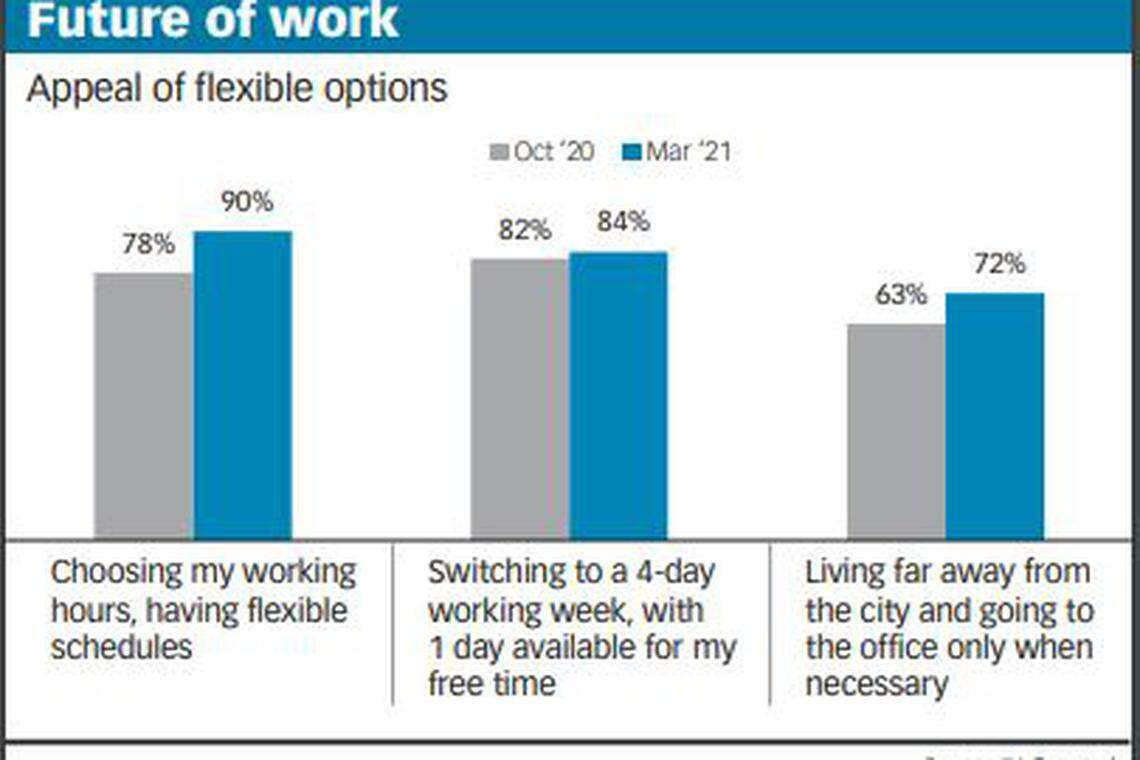Future of the office: where a fist bump beats the punch clock
Returning to workplaces will help ease workers' mental load, but first, the office is due for a redesign.
JLL's Worker Preferences Barometer 2021 provides a strong indication that offices will be more important now than before as the centre of the work ecosystem, and that an outstanding office environment will remain a critical strategy to engage employees who now prioritise a work-life balance over salary.
JLL's global barometer comprises a series of three surveys conducted in April 2020, October 2020 and March 2021. Employees in companies with staff strength of 100 or more and spanning all major industries across ten countries, including Singapore, were questioned on their feelings about working from home (WFH) and how it impacts their priorities at work, performance and well-being.
The following insights drawn from the responses of over 300 employees based in Singapore will be key in shaping the nation's future of work.
Firstly, physical offices are here to stay as WFH fatigue sets in. Workers say they are experiencing an increased amount of virtual fatigue, or burnout, and want to return to the office more.
They are craving face-to-face human interactions with colleagues, and are missing the change of scenery that comes from working and living in different places.
This has led to an increase in the ideal number of days that Singapore-based employees would like to work from the office - from just 1.7 days in the October 2020 survey to 2.3 days in the March 2021 survey.
A NEWSLETTER FOR YOU

Property Insights
Get an exclusive analysis of real estate and property news in Singapore and beyond.
At the same time, the ideal number of days that Singapore-based employees would like to WFH has fallen to 2.0 days in the March 2021 survey, down from 2.4 days in the October 2020 survey.
Secondly, purpose-led offices are the new future. People are more demanding about what the office should offer them in the future. The proportion of respondents who are satisfied with their current offices has dropped significantly, from 60 per cent in April 2020 to 45 per cent in March 2021.
This is a clear signal that offices need an in-depth redesign to meet employees' new expectations.
To this end, our survey suggests that offices of the future will have to be more humane and resilient. Of the employees based in Singapore, 71 per cent want to be working in an environment that puts health and well-being at the forefront.
One in two employees based in Singapore also want to be in workplaces that are resilient, in that they are able to innovate and adapt to future crises.
The survey also revealed that the future office has to cater to new working practices developed over the course of the pandemic, such as the option to work remotely and observing safe distancing.
Two in five employees expect to continue to leverage digital interactions whenever possible.
Similarly, two in five expect less density and more physical separation in their workplaces of the future, while one in four does not want to share their desk anymore.
Finally, flexible work is set to become mainstream. Work-life balance is the new employee motto, overtaking a comfortable salary as the number one priority of today's workforce. On this note, the appetite for flexible work has grown significantly, with nine in 10 respondents finding it an attractive flexibility option, up from eight in 10 in October 2020.

The office will be the primary place of work again. Long-lasting WFH practices are taking a heavy social and mental toll. At least one in two Singapore employees today is struggling to achieve boundaries and manage the mental load.
In particular, young parents (those with children aged 12 years or less), the 25- to 35-year-olds, and caregivers (employees living with an elderly family member) are most at-risk.
The office appears to be a tool to structure people's lives through bringing back social interactions which are most important to people living with an elderly family member, offering managerial support and learning opportunities to the younger generations.
The office environment can also recreate a more balanced working life anchored in healthy routines, with opportunities to socialise, break times and more clearly defined working hours - all aspects that young families are sorely missing at the moment.
We are convinced that the office will become the primary place of work again, but on the condition that it upgrades to meet the new priorities of the workforce.
The writer is head of research and consultancy, JLL Research
KEYWORDS IN THIS ARTICLE
BT is now on Telegram!
For daily updates on weekdays and specially selected content for the weekend. Subscribe to t.me/BizTimes
Global
Middle East tensions threaten global progress on inflation: World Bank
Consumer gulf widens as demand for premium and budget foods grows
Venice residents protest as city begins tourist entry charge
The great Singapore cookout: More F&B businesses expanding overseas
Luxury sector outlook clouded by China’s slow recovery
‘We aren’t going anywhere’: TikTok CEO expects to defeat US restrictions
